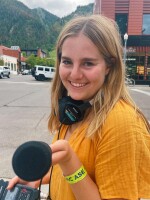Since December, Reed Carlman has spent just about every week in the Jackson library poring over paperwork with drop-in visitors.
He’s one of three workers for the county’s Community Health Outreach Workers (CHOW) program, which has held drop-in office hours in a study room at the Jackson library weekly since 2021.
Each session lasts the better part of two hours, according to Carlman. Since the popular program is first come, first served, people often wait in line to speak with CHOW workers, some coming as far as Star Valley or Salt Lake City. Most don’t speak English. The preventative health program addressed healthcare disparities and provided access, and on peak days, it served more than 12 clients.
The service will end June 10, a year ahead of schedule, as a result of cuts the Trump administration made in March to the Department of Health and Human Services. The state health department isn’t planning on fronting the difference and lost $40 million in grant funding.
A county vaccine program, originally for COVID-19, is also disappearing early.
Elissa Gramling is one of two workers in the clinic who will lose their jobs a few months early. Her program was slated to end in June but got the axe in March, though the county dipped into reserves for both the CHOW and vaccine jobs to keep them on longer to help ease the abruptness of the cuts.
Gramling said with the rise in communicable disease outbreaks across the country, Teton County would have benefited from more federal funding, not less.
“Through this grant, we were able to have staff available to help with rabies initiatives and measles initiatives,” Gramling said.

Seven measles cases have been recorded in Gallatin County in Montana, near Yellowstone National Park. Teton County health officials have said the risk for a local outbreak is real.
This meant anything from bringing awareness to life-changing scholarships at the St. John’s Health Foundation that helps with healthcare-related debt or navigating medicaid applications.
The CHOW program similarly relied on pandemic-era grants that were later expanded to address healthcare inequalities.
“COVID-19 revealed underlying health inequities that were really deadly,” said Carlman.
In the United States, non-white Americans have shorter life expectancies, are less likely to have health insurance and are more likely to die from COVID-19. In rural areas, these disparities are often more pronounced.
“I did not anticipate the cuts because I believed that the money had already been allocated,” said Carlman, whose dad, Len Carlman, sits on the Teton County Board of County Commissioners.
In April, 23 states, not including Wyoming, sued the Trump administration for cutting billions that supported these healthcare grants nationwide. The cuts still moved forward.
Carlman said CHOW brings awareness to financial assistance programs for healthcare costs that otherwise might slide under the radar or deter people with the oftentimes complicated applications. Once CHOW ends, he said, there will be no Spanish-speaking Medicaid help in the county unless another organization steps in.
He worries about the more than 80 people who have signed up for callback information since December.
The high attendance prompted the health department to double up on CHOW sessions until the last of the funding dries up and the program ends next month.
Jodie Pond, interim administrator for county commissioners, said the cuts suggest the pandemic-related expansion of public health resources has come to an end.
“The short-sightedness of being able to help people find care now instead of waiting until it costs the system more money. It’s the typical ‘prevention is not valued in our society,’” Pond previously told KHOL.
Carlman will continue to work in community health outreach after CHOW ends. This time, it won’t be in Wyoming, but across the country in Maine.
Gramling doesn’t have plans for what’s next, but she’ll likely continue similar work as a volunteer on ambulance rides in Grand Teton National Park this summer.
Editor’s Note: This story is part of a two-part series looking into how Wyoming is impacted by cuts to federal health grants. The second story focuses on statewide impacts. It can be read or heard here.








